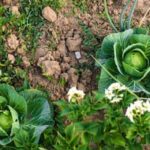Are you wondering how to keep your vegetable garden healthy and thriving without resorting to harmful chemicals? Using natural sprays for vegetable gardening is a safe and effective way to protect your plants from pests and diseases. In this article, we will explore the benefits of using natural sprays, common pests and diseases in vegetable gardens, homemade natural spray recipes, organic store-bought options, application best practices, and tips for maintaining a healthy vegetable garden using natural sprays.
When it comes to vegetable gardening, natural sprays offer a non-toxic alternative to chemical pesticides and fungicides. By harnessing the power of organic ingredients and essential oils, these natural sprays can help protect your plants while promoting a healthy ecosystem in your garden. Whether you’re dealing with pesky insects or stubborn diseases, there are a variety of natural spray options that can address these issues without harming the environment or compromising the quality of your produce.
In the following sections, we will delve into the benefits of using natural sprays for vegetable gardening and explore common pests and diseases that you may encounter in your garden. Additionally, we will provide you with homemade natural spray recipes as well as recommendations for organic store-bought options. With our guidance, you’ll be equipped with the knowledge and tools necessary to maintain a thriving vegetable garden using natural sprays.
The Benefits of Using Natural Sprays for Vegetable Gardening
There are numerous benefits to using natural sprays for vegetable gardening, which make them a popular choice among gardeners. Here are some of the key advantages of incorporating natural sprays into your vegetable garden routine:
- Environmentally friendly: Natural sprays are generally safer for the environment compared to chemical-based alternatives. They do not contain harmful synthetic chemicals that can leach into the soil or water supply, making them a more sustainable option for maintaining a healthy garden.
- Safe for beneficial insects: Unlike synthetic pesticides, natural sprays are less likely to harm beneficial insects such as ladybugs, bees, and butterflies. These insects play a crucial role in pollination and pest control in the garden, so using natural sprays can help preserve the overall balance of the ecosystem.
- Healthier produce: By using natural sprays, you can avoid exposing yourself and your family to potentially harmful residues on your fruits and vegetables. Organic and naturally-derived ingredients in these sprays pose less risk to human health compared to conventional chemical pesticides.
In addition to these benefits, natural sprays for vegetable gardening also offer an effective way to manage common pests and diseases without compromising the overall health of your garden. By choosing natural options, you can promote a thriving and sustainable vegetable garden while minimizing the impact on the environment.
Common Pests and Diseases in Vegetable Gardens
Identifying Common Pests
One of the challenges faced by vegetable gardeners is dealing with pests that can wreak havoc on their crops. Some common pests that can affect vegetable gardens include aphids, caterpillars, beetles, and mites. These pests can cause damage to plants by feeding on foliage, sucking sap from stems, or boring into fruits and vegetables. It is important for gardeners to be able to identify these pests in order to take appropriate measures to control them.
Recognizing Common Diseases
In addition to pests, vegetable gardens are also susceptible to various diseases that can negatively impact plant health and productivity. Common diseases affecting vegetable crops include powdery mildew, blight, rot, and wilt. These diseases can spread rapidly and lead to the deterioration of entire crops if left unchecked. It is crucial for gardeners to be able to recognize the symptoms of these diseases so that they can implement preventive measures and treatment options as necessary.
Understanding the Impact
The presence of pests and diseases in vegetable gardens can have a significant impact on crop yield and quality. Pests can cause physical damage to plants, reduce plant vigor, and even transmit harmful viruses. Likewise, diseases can lead to stunted growth, wilting, discoloration of leaves, and overall poor plant health. As a result, it is essential for gardeners to be proactive in managing pest infestations and controlling the spread of diseases in order to maintain a thriving vegetable garden.
By understanding the common pests and diseases that affect vegetable gardens, gardeners can better equip themselves with the knowledge needed to identify potential problems early on and take appropriate action using natural sprays for vegetables gardening or other organic pest control methods.
Homemade Natural Spray Recipes for Vegetable Gardens
When it comes to maintaining a healthy and thriving vegetable garden, using natural sprays can be an effective way to control pests and diseases without the use of harmful chemicals. Making your own homemade natural sprays for vegetable gardening is not only environmentally friendly, but it can also be cost-effective. Here are some easy recipes for homemade natural sprays that you can use in your vegetable garden:
Homemade Natural Spray Recipes
- Garlic and Pepper Spray: Mix 2 hot peppers, 1 garlic bulb, 1 tablespoon of dish soap, and 1 quart of water in a blender. Let the mixture sit for 24 hours, then strain and spray on your vegetables.
- Neem Oil Spray: Combine 2 teaspoons of neem oil, 1 teaspoon of mild liquid soap, and 1 quart of warm water in a spray bottle. Shake well before using and apply to your vegetable plants.
- Baking Soda Spray: Mix 1 tablespoon of baking soda, 1 teaspoon of dish soap, and 1 gallon of water. Use this spray to prevent fungal diseases on your vegetable crops.
These natural spray recipes are simple to make and safe to use on your vegetables. They can help protect your plants from common pests like aphids, mites, and caterpillars, as well as fungal diseases that can affect the health of your crops.
Using homemade natural sprays for vegetable gardening not only promotes a healthier environment but also ensures that you are consuming fruits and vegetables that are free from harmful chemical residues. By integrating these natural solutions into your gardening routine, you can cultivate a bountiful harvest while minimizing the impact on the ecosystem.
Organic Store-Bought Natural Sprays for Vegetable Gardens
When it comes to maintaining a healthy and thriving vegetable garden, organic store-bought natural sprays can be a convenient and effective option. These products are designed to help control pests and diseases while also being environmentally friendly. Many organic store-bought natural sprays are made with plant-based ingredients, making them safe for both the plants and the surrounding ecosystem.
One popular natural spray that is commonly found in stores is neem oil. Neem oil is derived from the seeds of the neem tree and has been used for centuries as a natural insecticide.
It works by disrupting the life cycle of insects and can help control common garden pests such as aphids, mites, and whiteflies. Neem oil is also known for its antifungal properties, making it an all-around great option for vegetable gardeners looking for a natural solution to pest and disease management.
Another organic store-bought natural spray that has gained popularity in recent years is insecticidal soap. This gentle yet effective spray is made from plant-derived fatty acids and works by suffocating soft-bodied insects such as aphids, mealybugs, and spider mites. Insecticidal soap is non-toxic to humans, animals, and beneficial insects, making it a safe choice for use in vegetable gardens.
It’s important to note that while organic store-bought natural sprays can be convenient, it’s still crucial to read and follow the instructions on the product label carefully. Understanding how to properly apply these sprays and being aware of any potential risks or precautions will help ensure their effectiveness while minimizing any negative impact on your vegetable garden ecosystem.
| Organic Store-Bought Natural Sprays | Benefits |
|---|---|
| Neem Oil | Controls common garden pests such as aphids, mites, and whiteflies; antifungal properties |
| Insecticidal Soap | Suffocates soft-bodied insects like aphids, mealybugs, spider mites; non-toxic to humans, animals & beneficial insects |
Application and Best Practices for Using Natural Sprays in Vegetable Gardens
When it comes to using natural sprays for vegetable gardening, proper application and best practices are essential for achieving the desired results. Whether you are using homemade natural spray recipes or organic store-bought options, how you apply these products can greatly affect their effectiveness in combating pests and diseases in your vegetable garden.
One of the most important factors to consider when applying natural sprays is timing. It is crucial to apply the sprays at the right time in the plant’s growth cycle to maximize their impact. For example, some natural sprays may be more effective when applied during certain stages of a plant’s development or during specific times of the day when pests are most active.
Additionally, it is vital to apply natural sprays to both the tops and bottoms of leaves as well as the stems of plants, as this is where many pests and diseases tend to reside. This thorough application ensures that all areas of the plant are protected from potential threats. Furthermore, following proper dilution rates and mixing instructions for homemade natural spray recipes is important to avoid damaging your plants.
Moreover, regular monitoring of your vegetable garden is key when using natural sprays. By keeping an eye on your plants, you can catch any signs of pest or disease infestations early on and take proactive measures with natural sprays before the issue escalates. This level of vigilance can help maintain a healthy and thriving vegetable garden throughout the growing season.
| Vegetable | Natural Spray |
|---|---|
| Tomatoes | Neem oil spray |
| Cabbage | Diatomaceous earth spray |
Tips for Maintaining a Healthy Vegetable Garden Using Natural Sprays
Maintaining a healthy vegetable garden using natural sprays can be an effective and eco-friendly way to protect your plants from pests and diseases. By implementing the following tips, you can ensure that your vegetable garden thrives and produces a bountiful harvest.
Regular Inspection and Monitoring
One of the most important tips for maintaining a healthy vegetable garden is to regularly inspect and monitor your plants for any signs of pests or diseases. By catching issues early on, you can prevent them from spreading and causing damage to your entire garden. Look for holes in leaves, discolored spots, or any other signs of infestation.
Proper Application
When using natural sprays for your vegetable garden, it’s crucial to follow the instructions for proper application. Ensure that you evenly cover the entire plant, including both the tops and bottoms of leaves. Be mindful of any specific timing or weather conditions recommended for application to maximize effectiveness.
Consistent Maintenance
Consistent maintenance is key to keeping your vegetable garden healthy when using natural sprays. This includes regular watering, weeding, and providing adequate sunlight for your plants. Healthy plants are more resilient against pests and diseases, so investing time in their overall care will contribute to their success.
By incorporating these tips into your gardening routine, you can maintain a healthy vegetable garden using natural sprays while promoting sustainability and environmental consciousness in your home garden.
Conclusion
In conclusion, the use of natural sprays for vegetable gardening holds great promise for the future of sustainable and eco-friendly agricultural practices. As more people become conscious of the impact of synthetic chemicals on the environment and their own health, there is increasing interest in finding natural alternatives for pest and disease management in vegetable gardens.
The availability of homemade recipes and organic store-bought options make it easier for gardeners to transition towards a more natural approach to plant care.
While common pests and diseases can pose significant challenges to a healthy vegetable garden, the benefits of using natural sprays far outweigh these obstacles. Not only do these natural solutions help control pests and diseases effectively, but they also promote a healthier garden ecosystem overall. By reducing exposure to harmful chemicals, natural sprays contribute to creating a safe environment for beneficial insects, birds, and other wildlife that play crucial roles in maintaining ecological balance within the garden.
As more research is conducted on the efficacy of natural sprays for vegetable gardening, it is likely that new methods and products will continue to emerge in the market. With ongoing advancements in organic farming and sustainable agriculture, we can expect to see an increase in innovative approaches to pest and disease management specifically tailored for vegetable gardens.
This progress signals a promising future for the integration of natural sprays into mainstream vegetable gardening practices, ultimately leading towards a more environmentally-friendly and health-conscious approach to growing our own food.
Frequently Asked Questions
How Do You Make Natural Bug Spray for Vegetables?
To make natural bug spray for vegetables, you can use ingredients like garlic, onion, red pepper flakes, and water. Simply blend these ingredients together and strain the liquid before spraying it on your vegetable plants.
What Can I Spray on My Vegetables to Keep Bugs From Eating Them?
You can spray a mixture of neem oil and water on your vegetables to keep bugs from eating them. Neem oil has insecticidal properties that can help repel pests without harming the plants or the environment.
What Is a Natural Pesticide for Vegetables?
One natural pesticide for vegetables is a mixture of dish soap and water. This solution can effectively control pests like aphids, spider mites, and whiteflies on your vegetable plants without using harmful chemicals. Additionally, introducing beneficial insects like ladybugs or praying mantises can also act as a natural form of pest control for your vegetables.

If you’re looking to get into vegetable gardening, or are just looking for some tips on how to make your current garden better, then you’ve come to the right place! My name is Ethel and I have been gardening for years. In this blog, I’m going to share with you some of my best tips on how to create a successful vegetable garden.





